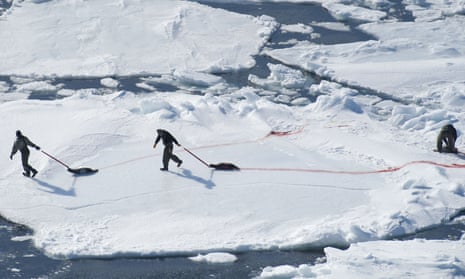Justin Trudeau’s government has come under renewed pressure to ban seal hunting after it emerged that Canada is spending far more on monitoring seal hunts than it receives in the export value of seal products.
Documents obtained under freedom of access laws show that Canada spends around $2.5m a year to monitor seal hunts that occur in the remote north-east. By comparison, the 2014 export figure for seal products was just $500,000.
The documents reveal that government officials at Fisheries and Oceans Canada discussed ways to combat campaigns opposed to the seal hunts. The 2009 files suggest that a new strategy was needed to “educate” people of the benefits of the hunt.
Sealers and animal welfare groups have been locked in fierce disagreement over the economic and ethical merits of the seal hunt for decades. But activists hope there can now be a breakthrough with Canada’s new Liberal government, elected in 2015. Prime minister Trudeau was recently lobbied by actor Pamela Anderson to phase out government subsidies that prop up the struggling sealing industry.
Last year, Canada’s government set a quota of 468,000 harp, hooded, and grey seals to be killed for the year. However, the market for Canadian seal fur isn’t what it once was, hampered by a 2009 European Union ban on the trade due to welfare concerns. Canada appealed the ban to the World Trade Organization, but lost in 2014. The US has also shut down its involvement in the trade of seal products.
While seal numbers have rebounded – harp seals now number 7.3 million, three times the 1970s population – the sealing industry has contracted. It’s estimated that there are fewer than 400 active sealers now, down from nearly 6,000 in 2006.
The Canadian government and the seal-fur industry maintain that the practice is necessary as it generates around $35m a year in knock-on economic benefits. The regional government of Newfoundland and Labrador, where much of the hunting occurs, also states that the hunt “brings balance to the marine ecosystem” because of the large number of fish eaten by seals.
Hunts are regulated to ensure that seals are killed quickly using a high-powered rifle, a club, or a hunting tool called a hakapik, which is a wooden staff with a hook at the end. But conservationists claim the regulations are inadequate and the sealing industry should be phased out.
“The hunt happens in an area larger than France in a very harsh, remote location,” said Rebecca Aldworth, executive director of the Humane Society International-Canada, which obtained the government documents. “It’s very expensive to monitor this hunt, and it’s impossible to ensure a humane death in conditions like these. The regulations even allow people to hook conscious animals onboard with a metal spike, which no one would consider humane.
“The industry makes no economic sense. We know the seal hunt would have ended years ago if it was left to the market. We know our campaign is winning and we are now at a crossroads. We need to all move forward together beyond commercial sealing.”
The Humane Society has proposed a buy-out of existing sealing licenses, with financial help for fishermen to transition to other areas. But the Canadian government has given no indication it would support such a plan.
A spokeswoman for Fisheries and Oceans Canada said sealing is “important economic and cultural activity in communities in Atlantic Canada, Quebec, and the Arctic.
“Canadian harvesting practices are among the best in the world. They are guided by rigorous animal welfare principles that are internationally recognized by virtually all independent observers. We monitor the seal harvest closely and are committed to enforcing the regulations.”
The spokeswoman said the EU ban had “negatively impacted” exports, but that the government was committed to opening up new markets for seal fur.

Comments (…)
Sign in or create your Guardian account to join the discussion